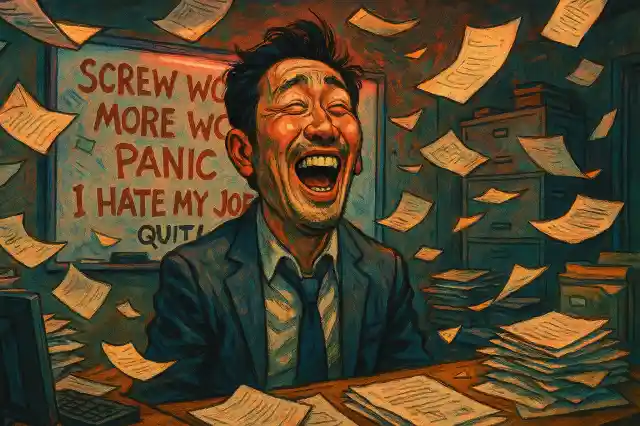The Unconventional Charm of “Lobby”: How a Black Comedy Became Korea’s Surprise Box Office Contender
How Ha Jung-woo’s audacious satire of politics and startups is shaking up Korean cinema
Have you ever found yourself rooting for the underdog, especially when the odds seem stacked against them? That’s exactly the feeling sweeping through Korean cinema fans with the arrival of Lobby (로비). In a landscape dominated by big-budget blockbusters and familiar faces, this quirky, dark comedy directed by and starring Ha Jung-woo has become an unlikely sensation. Maybe you’re tired of formulaic plots or just looking for a film that dares to poke fun at the absurdities of modern life—either way, Lobby offers a refreshing escape. Let’s dive into why this film is making waves, what makes it so unique, and whether it’s worth your next movie night pick!
- Genre-bending satire: Lobby blends slapstick humor with biting political commentary, offering a fresh take on Korean bureaucracy and startup culture.
- Box office surprise: Despite modest admissions, the film outperformed expectations and sparked national conversation.
- Ha Jung-woo’s dual role: As both director and star, Ha delivers a performance that’s both hilarious and thought-provoking.
- Divisive but daring: The film’s abrupt tonal shifts and insider jokes have polarized viewers, yet its authenticity is winning over a dedicated fanbase.
- Cultural relevance: Lobby reflects growing public fatigue with institutional corruption and the pressures of Korea’s tech-driven society.
Table of Contents
Introduction: Korea’s New Satirical Underdog
Breaking Down “Lobby’s” Box Office Journey
Behind the Scenes: Genre Experimentation and Audience Reaction
Cultural Impact: Why “Lobby” Matters
Who Should Watch “Lobby”?
Lessons for Aspiring Filmmakers
Conclusion: The Road Ahead for Korean Satire
Introduction: Korea’s New Satirical Underdog
In 2025, when most Korean moviegoers expected another season of safe blockbusters, Lobby (로비) crashed the party with its offbeat humor and sharp critique of political and business culture. Directed by Ha Jung-woo, who also stars as the hapless startup CEO Chang-wook, the film takes audiences on a wild ride through the absurd world of government contracts, backroom deals, and “lobby golf.” Rather than playing it safe, Lobby leans into its weirdness, offering a blend of slapstick, satire, and social commentary that’s both entertaining and thought-provoking.
Breaking Down “Lobby’s” Box Office Journey
Released on April 3, 2025, Lobby quickly claimed the top spot among new releases, a remarkable feat for a politically charged black comedy in a traditionally slow season. On its first day, the film drew 37,160 admissions, signaling strong curiosity. By day six, admissions dipped to around 10,273—a typical challenge for niche films—but the cumulative total reached 175,584 by April 8. With a break-even point set at 1.5 million viewers and a budget of about 7 billion KRW (roughly $5.2 million), commercial success remains uncertain. Still, its rivalry with fellow spring release The Game created a rare “double act” that energized local cinemas.
| Milestone | Admissions | Notes |
|---|---|---|
| Day 1 | 37,160 | Strong opening curiosity |
| Day 6 | ~10,273 | Typical post-premiere drop |
| April 8 | 175,584 (cumulative) | Significant for a satire |
For more on the film’s box office journey, see Chosun Ilbo’s coverage.
Behind the Scenes: Genre Experimentation and Audience Reaction
Lobby follows Chang-wook, a research-obsessed CEO who’s terrible at business and even worse at golf. Desperate to save his company, he enters the world of “lobby golf” to win a lucrative government project. The film’s genre-blending approach—mixing slapstick, deadpan humor, and sharp political critique—has divided audiences. Many praise its authenticity and willingness to skewer Korea’s bureaucracy and startup culture, while others find the abrupt shifts between comedy and drama jarring.
- Social Satire: The film lampoons everything from backroom deals to the performative ambition of modern entrepreneurs.
- Ha Jung-woo’s Dual Role: As both director and lead, Ha delivers a meta-commentary on ambition and corruption, balancing deadpan comedy with moments of real vulnerability.
- Audience Reactions: Online reviews call it “brain-off entertainment” and “the perfect stress reliever for office workers.”
- Controversies: Critics argue that the film’s tonal whiplash and insider political jokes may alienate some viewers.
For a detailed cast list and more, visit AsianWiki’s Lobby page.
Cultural Impact: Why “Lobby” Matters
Beyond its numbers, Lobby taps into deeper frustrations in Korean society. The protagonist’s struggles mirror the real-world anxieties of young professionals navigating a hyper-competitive tech sector. The film’s cynical humor resonates with audiences weary of institutional corruption and political fatigue. In this sense, Lobby joins the ranks of genre innovators like Parasite, proving that socially conscious narratives can be both entertaining and impactful.
- Startup Realism: Chang-wook’s journey reflects the challenges faced by many Korean entrepreneurs.
- Political Fatigue: The film’s satire strikes a chord in an era of eroding trust in institutions.
- Genre Innovation: Lobby demonstrates that bold, unconventional storytelling can find an audience.
Who Should Watch “Lobby”?
Are you a fan of political satire, or do you love seeing actors stretch their creative muscles? Lobby is a must-watch for:
- Political Satire Enthusiasts: If you enjoyed Veep or The Death of Stalin, this film’s Korean twist will appeal to you.
- Ha Jung-woo Fans: His performance as a morally flexible entrepreneur is both hilarious and nuanced.
- Industry Observers: The film’s OTT potential could make it a sleeper hit, much like Okja or Space Sweepers.
You can check if Lobby is available for streaming on IZE.
Lessons for Aspiring Filmmakers
- Authenticity Over Formula: Lobby’s unapologetic weirdness proves audiences crave originality.
- Timing Matters: Releasing during a box office lull helped it stand out despite limited marketing.
- Embrace Niche Audiences: By targeting young professionals and office workers, the film built a loyal following.
For more on the evolution of Korean cinema, explore Bong Joon-ho’s films.
Conclusion: The Road Ahead for Korean Satire
Lobby may not become a mainstream blockbuster, but its cultural footprint is undeniable. As Ha Jung-woo continues to push boundaries as both actor and director, this film signals a new willingness in Korean cinema to experiment and challenge the status quo. For viewers weary of predictable storytelling, Lobby offers a chaotic, cathartic, and ultimately refreshing alternative. Will more filmmakers dare to follow its lead?
Looking for more thought-provoking Korean films? Check out our deep dives on Memories of Murder and Oldboy.


